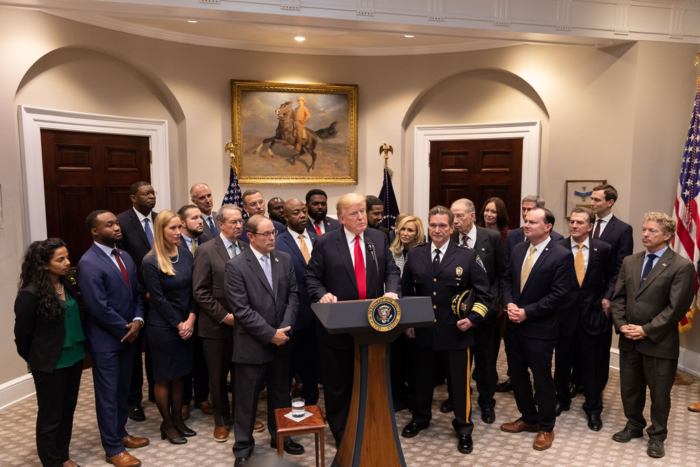President Trump announces First Step Act (Source: Flickr)
In 2002, Weldon Angelos, a father of two, was sentenced to 55 years without parole because of mandatory minimum sentencing laws. The crime? Selling marijuana three times while in possession of a firearm.
Now not only is this sentence too severe for a nonviolent drug offender, but even Paul G. Cassell, the judge that convicted Angelos, agrees it was too harsh. Cassell compared the punishment–based on minimum sentencing guidelines–to a plane-hijacking (24 years), child-raping (11 years), and to a terrorist (20 years).
Congress passed an unprecedented criminal justice reform bill right before the shutdown aimed at starting to fix those problems.
Garnering support from every Democrat, and all but 12 Republicans in the Senate along with the President, the goal of the First Step Act, or S.3629, is “to provide for programs to help reduce the risk that prisoners will recidivate upon release from prison, and for other purposes.”
The First Step Act offers a second chance to those who deserve it, increases early-release options, and even rewards a credit system for good behavior. The government is putting a greater focus on the proper rehabilitation of prisoners and preventing them from falling, or relapsing, back into crime. This takes up the position that the purpose of the justice system is not just to punish them, but to rehabilitate citizens so they can return to being contributing members of society.
Numerous other issues besides mandatory minimums lay within our prison system:
Public defenders are overworked, understaffed, and underpaid.
The bail-bond system unfairly discriminates against the poor by keeping them in prison for months at a time, preventing them from working and providing for their families.
Privatized prisons have a history of neglect and mistreatment.
The question remains on what should happen to those serving sentences for crimes that are now legal, such as possession of marijuana. These challenges still exist and must be addressed, but this historic bill is a great ‘first step’ towards fixing those problems.








